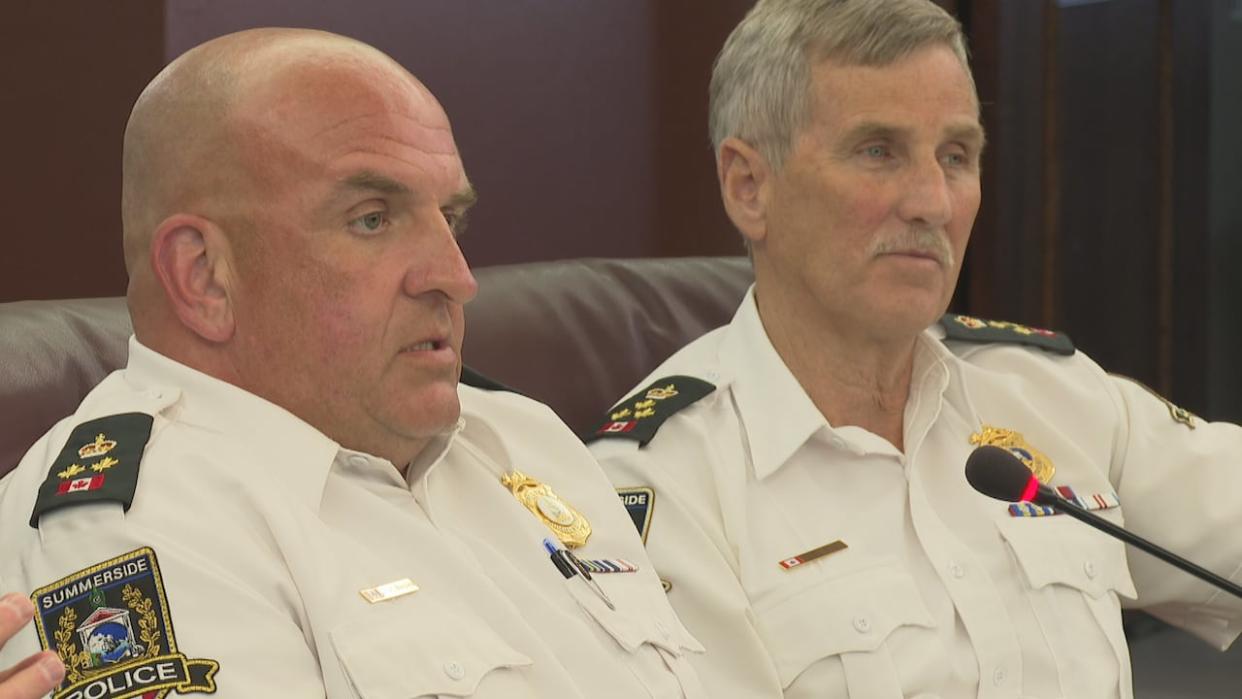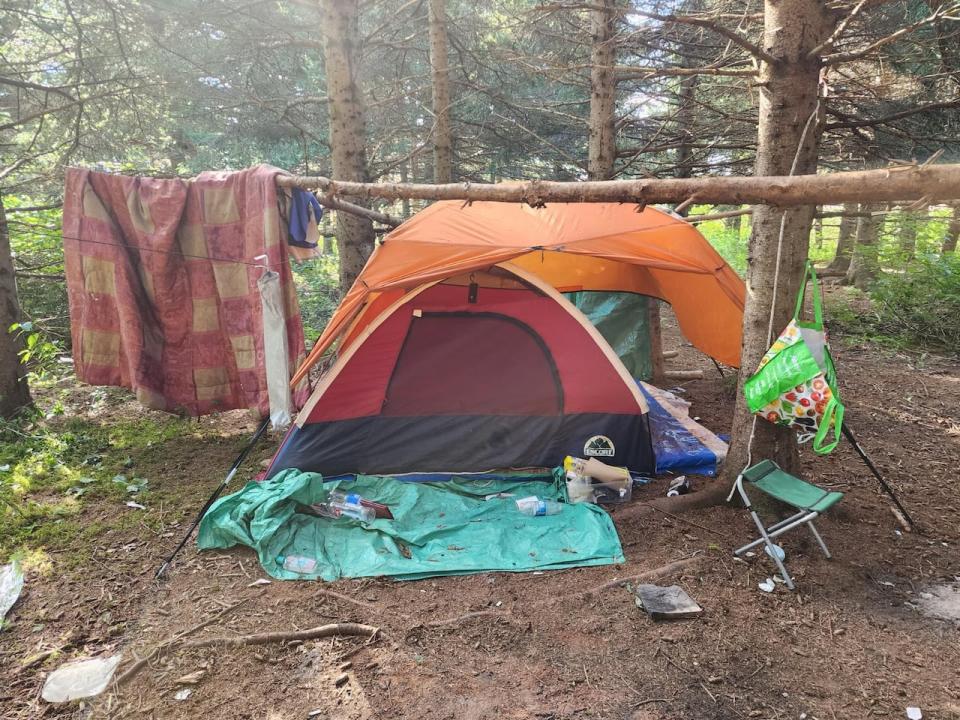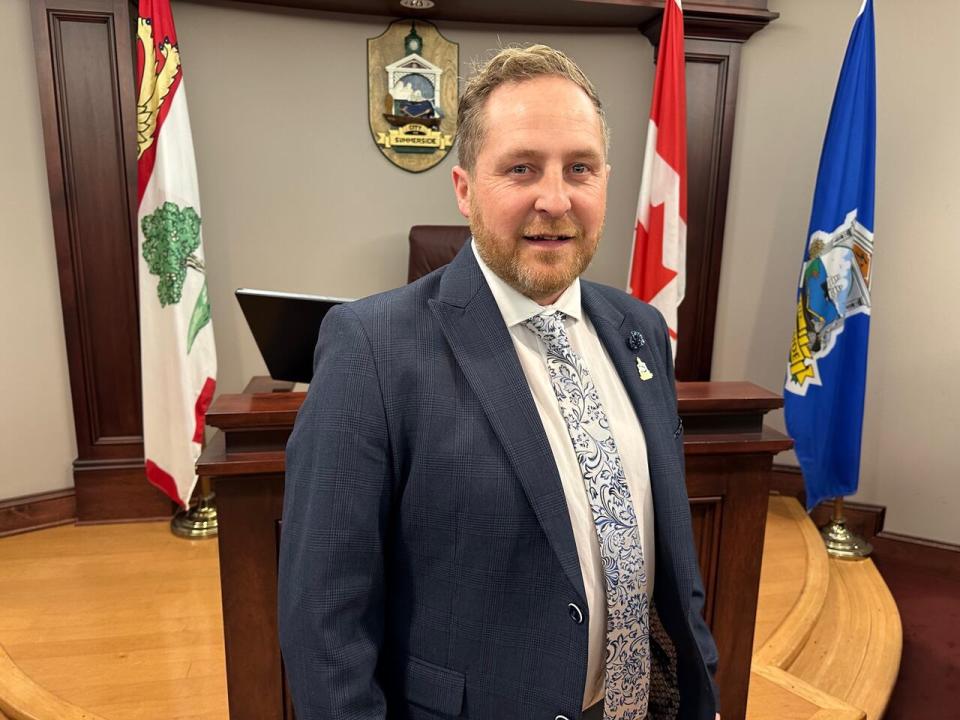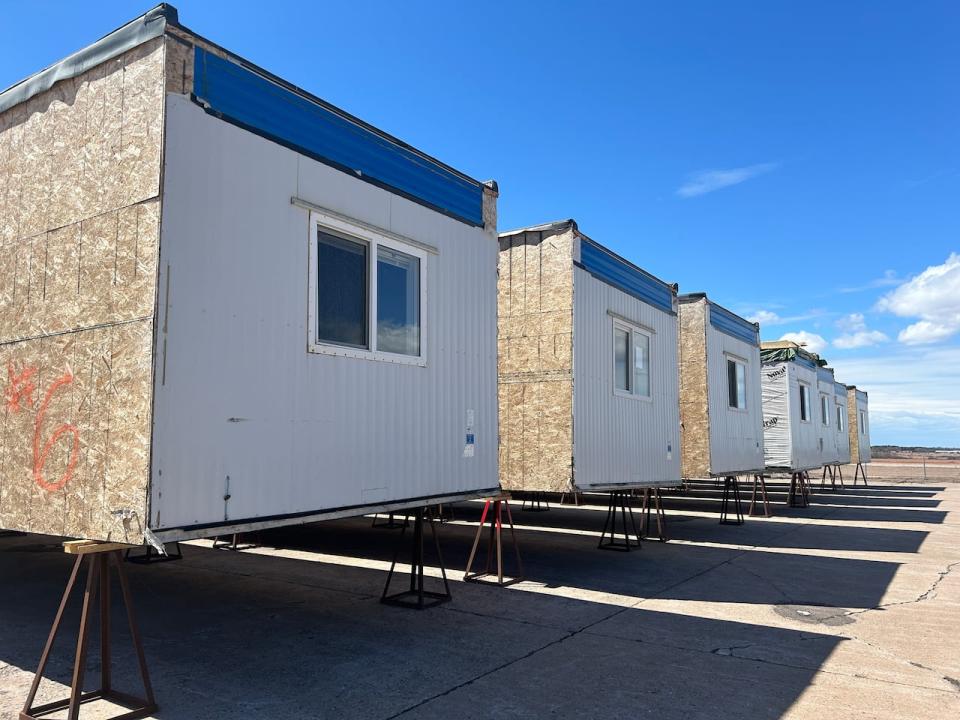Complaints about homeless residents eating up Summerside police resources, council told

Summerside police and city staff say more officers are needed to address complaints connected to city residents facing addiction and homelessness.
The city estimates there are about 30 people dealing with homelessness in the city, scattered in about 10 active encampments.
Cleaning up those encampments has cost the city about $40,000 since April 1, according to data presented at a regular meeting of council on Tuesday night. Police resources are also being strained by calls related to mental health, responding to more than 600 in 2023, said Summerside Chief Sinclair Walker.
"The significant portion of the well-being calls are related to the unhoused population in Summerside. We anticipate well-being calls for services will drastically increase in 2024," Walker said, during Tuesday's council meeting.

A tent that was being used as a home in Summerside in August of 2023. (Submitted by Elysha Whitlock)
"This year so far we have had 300-plus calls related to loitering, trespassing, encampments."
The problems of homelessness and addiction are intertwined, said Walker.
Some city residents are concerned about loitering impacting local businesses, said city staff. There are safety concerns about discarded needles and some residents are afraid to visit green spaces where encampments may be set up. Police have increased foot patrols in the city, but they are short-staffed and having trouble managing the situation, Walker said.
"We've lost a number of people in the last year or so to other police services and recruitment and retention has become a serious issue," he said.
There is an immediate need for four police officers in the city, he told council.
Cities facing same issues
Some councillors want the province to help foot the bill.
They noted the province funds some Charlottetown police positions. There are provincially-funded officers connected to the Community Outreach Centre, and others have been funded through the mobile mental health program.

'I think we deserve, and I think the population that is struggling deserves, the same resources [as Charlottetown],' says Coun. Cory Snow (Aaron Adetuyi/CBC)
"I don't know why we wouldn't be getting at least some of that here since the population is so transient, and they go back and forth between Summerside and Charlottetown so easily," said Coun. Carrie Adams, who also chairs the emergency services and communications committee.
"We're dealing with a lot of the same issues they are dealing with down there [in Charlottetown] and in other communities," Coun. Cory Snow said, adding the province should be funding a community navigator specific to the area.
"We deserve, and I think the population that is struggling deserves, the same resources."
The province does have a mental health and addictions patient navigator who can be contacted at 902-218-3289.
Laws need expanding beyond alcohol
While residents express concerns about open drug use, there has only been one actual complaint filed with police since the start of 2024.
Walker suggested laws need to be tightened so people can be charged for intoxication.
"There is a section in the Criminal Code called causing a disturbance. It can cover somewhat but, believe it or not, it only covers intoxication for alcohol alone, so there is no coverage there for drugs," Walker said, adding the same applies for the provincial Liquor Control Act.
"It's only for alcohol."

Modular building units are standing ready to be converted into a shelter complex in Summerside, but the province hasn't selected an operator. (Tony Davis/CBC)
Walker raised the example of Manitoba's Intoxicated Persons Detention Act, which allows police to arrest people under the influence of drugs and release them when they are sober, Walker said.
"We have a P.E.I. chiefs meeting at the end of the month and that's going to be one of the topics on the agenda, to have that act put in place," he said.
Police also mentioned a lack of resources in the area, including few options for low-barrier shelter. People can enter a low-barrier shelter while intoxicated, but can't use on site. Winter Street Men's Shelter, run by the Native Council of P.E.I., is a low-barrier shelter in Summerside.
"The unhoused they, of course, they want to live that oppositional lifestyle. They don't want to live by rules and even when we do have the low-barrier shelters I am sure they will take advantage of them at some point, but we also know there is going to be people not going to use them as well," Walker said.
While J. P. Desrosiers, deputy CAO with the city, is behind more funding for police, he said that won't be all that's needed to help address issues with those struggling with homelessness and addiction.
"It's one layer of a very large concern and a very large issue. I think right now anytime there's an issue that people just simply don't know how to handle, the police tend to be the first line of defence. Our police officers are meant to deal with core policing functions," he said.
"Many of the things they're focusing or they're being asked to focus on are more social issues that they're not, you know, equipped to deal with."
Patience wearing
Another piece of the puzzle is the province's emergency shelter which is set to come to Summerside pending conditions set by city council. Those conditions include an operational and security plan for the site. An operator still needs to be named.
"Council, when we received the restricted-use application, turned that around pretty quickly," said Summerside Mayor Dan Kutcher.
"The City of Summerside has been incredibly patient as the provincial government works to find an operator. I think the patience continues to wear on our community as we see more and more people living unhoused with nowhere for them to go."
With no shelter available, said Walker, when an encampment is dismantled and cleaned up, its residents just move along and set up another one and the cycle repeats.


